Deutsche Bank Bundle
Can Deutsche Bank Reclaim its Former Glory?
Deutsche Bank's journey through the ever-evolving financial services industry demands a keen understanding of its growth strategy and future prospects. The bank's strategic pivot in recent years, including streamlining operations, underscores its commitment to adapting to the global economic outlook. This transformation is crucial for maintaining its position as a leading global financial institution.
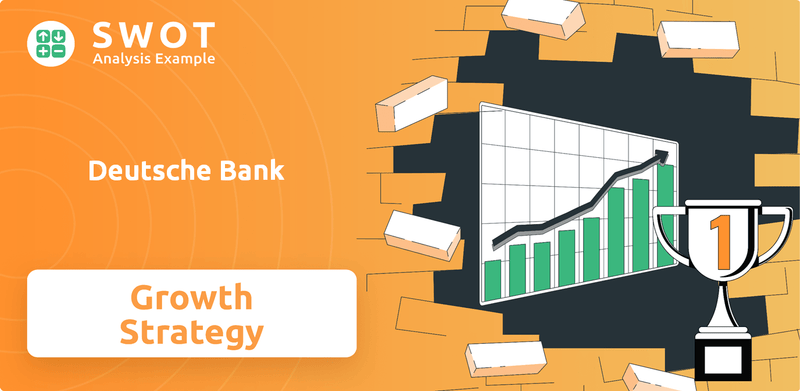
Founded in 1870, Deutsche Bank has a rich history, evolving from a trade facilitator to a global powerhouse. Today, we delve into a comprehensive Deutsche Bank SWOT Analysis to understand its strategic initiatives and the competitive landscape. This analysis will explore its expansion plans, digital transformation strategy, and how it navigates regulatory challenges, offering insights into its long-term investment strategy and the future of banking.
How Is Deutsche Bank Expanding Its Reach?
Deutsche Bank's expansion initiatives are strategically designed to capitalize on its core strengths and adapt to evolving market demands. A key focus involves selective growth in its Corporate Bank and Private Bank divisions, particularly in regions offering high growth potential. The bank is actively strengthening its presence in key Asian markets, leveraging its transaction banking capabilities to support cross-border trade and investment flows.
In terms of product expansion, Deutsche Bank continues to enhance its digital offerings within retail and private banking, aiming to attract new customer segments and improve client engagement through user-friendly platforms and personalized services. The bank is also exploring opportunities to expand its sustainable finance solutions, responding to the increasing demand for ESG-aligned investments and advisory services from institutional and corporate clients. This includes increasing its portfolio of green bonds and sustainable loans.
While specific timelines for major new market entries are not always publicly disclosed, the bank's strategy emphasizes organic growth within existing strongholds, complemented by strategic partnerships and technological advancements that enable broader reach and service delivery. For example, in 2024, Deutsche Bank continued to invest in its wealth management capabilities in the Asia-Pacific region, aiming to capture a larger share of the growing affluent and high-net-worth individual market. The bank's ambition to achieve a Common Equity Tier 1 (CET1) ratio of above 13% by 2025 further supports its capacity for measured expansion.
Deutsche Bank is significantly investing in the Asia-Pacific region, focusing on wealth management and corporate banking. This expansion is driven by the region's high growth potential and increasing demand for financial services. The bank aims to capture a larger market share in this dynamic area, as highlighted in their strategic plans for 2024 and beyond.
The bank is undergoing a digital transformation to enhance its services and customer experience. This includes upgrading digital platforms for retail and private banking clients, offering personalized services and improved user interfaces. Deutsche Bank's digital strategy is crucial for attracting new customers and remaining competitive in the financial services industry.
Deutsche Bank is expanding its sustainable finance solutions to meet the growing demand for ESG-aligned investments. This involves increasing its portfolio of green bonds and sustainable loans, catering to institutional and corporate clients. The bank's focus on sustainability aligns with global trends and regulatory pressures.
Deutsche Bank is leveraging strategic partnerships to broaden its reach and service delivery capabilities. These collaborations enable the bank to access new markets and offer specialized services. Such partnerships are a key component of the bank's growth strategy, particularly in areas where organic expansion is slower.
Deutsche Bank's growth strategy focuses on several key areas to ensure sustainable expansion and maintain a competitive edge. The bank's strategic initiatives are designed to capitalize on emerging opportunities and adapt to the evolving financial landscape. The bank is committed to enhancing its financial performance and creating long-term value for its stakeholders. Further insights can be found in Mission, Vision & Core Values of Deutsche Bank.
- Asia-Pacific: Significant investment in wealth management and corporate banking.
- Digital Transformation: Enhancing digital platforms for improved customer experience.
- Sustainable Finance: Expanding ESG-aligned investment solutions.
- Strategic Partnerships: Leveraging collaborations for broader market reach.
Deutsche Bank SWOT Analysis
- Complete SWOT Breakdown
- Fully Customizable
- Editable in Excel & Word
- Professional Formatting
- Investor-Ready Format
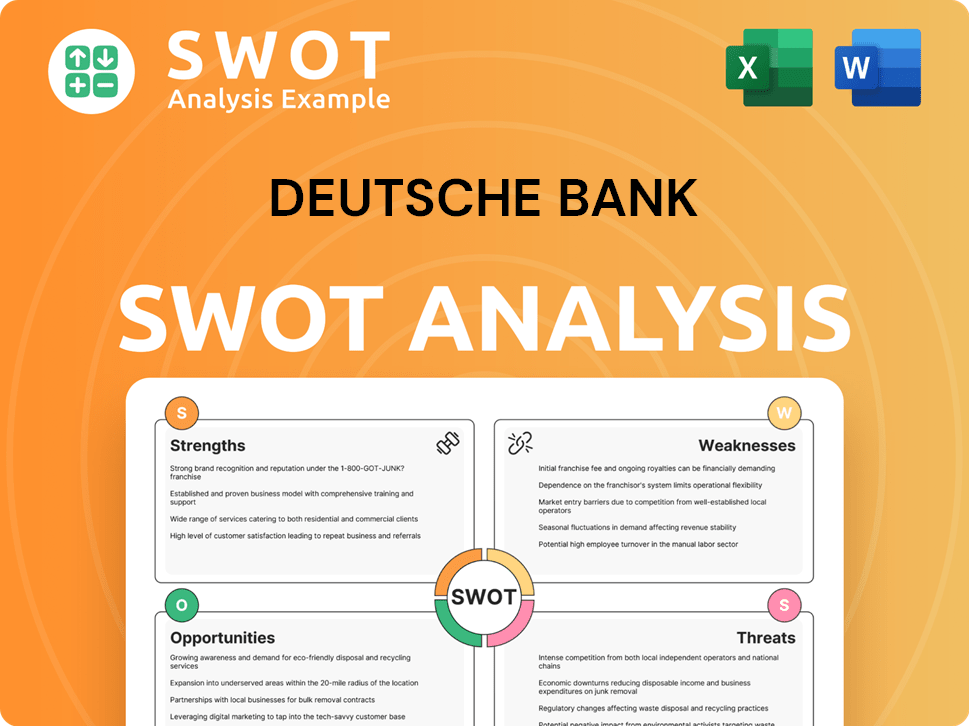
How Does Deutsche Bank Invest in Innovation?
Deutsche Bank's innovation and technology strategy is central to its sustained growth, focusing on digital transformation, automation, and the adoption of cutting-edge technologies. This approach is crucial for navigating the dynamic landscape of the financial services industry and maintaining a competitive edge. The bank's commitment to technological advancement is evident in its substantial investments in research and development.
The bank's strategic initiatives for 2024 and beyond prioritize modernization of its core IT infrastructure. This includes implementing cloud-based solutions to improve data processing capabilities and reduce operational costs. Furthermore, Deutsche Bank is leveraging artificial intelligence (AI) and machine learning (ML) across various functions, including risk management, fraud detection, and personalized customer service. These technological advancements are key to adapting to investment banking trends and the global economic outlook.
Deutsche Bank's digital transformation strategy is also geared towards enhancing customer experience and operational efficiency. The bank aims to achieve approximately EUR 2.5 billion in gross cost savings by 2025, partly through operational efficiencies driven by technology and automation. This focus is crucial for improving its financial performance review and ensuring long term investment strategy success. The bank is also exploring the potential of distributed ledger technology (DLT) for streamlining processes in areas like trade finance and securities settlement.
Deutsche Bank is heavily investing in digital transformation to modernize its core IT infrastructure. This includes migrating to cloud-based solutions to improve data processing and reduce operational costs. The bank's digital initiatives are designed to enhance customer experience and streamline internal processes.
AI and machine learning are being deployed across various functions, including risk management and fraud detection. AI-powered analytics are used to derive deeper insights from vast datasets, enabling more informed decision-making and tailored product offerings. These technologies are crucial for navigating regulatory challenges.
Cloud-based solutions are a key component of Deutsche Bank's technology strategy. The bank is leveraging cloud technology to improve data processing capabilities and reduce operational costs. This shift supports the bank's efforts to enhance efficiency and agility.
Automation plays a significant role in Deutsche Bank's strategy to achieve cost savings and improve operational efficiency. Automation is implemented across various processes to streamline operations. This is a key factor in the bank's competitive landscape.
Deutsche Bank is exploring the potential of DLT for streamlining processes in areas like trade finance and securities settlement. DLT could enhance efficiency and reduce risks in these critical operations. This technology is part of the bank's future of banking strategy.
Technology plays a crucial role in developing green financial products and assessing environmental risks. Deutsche Bank's sustainability goals are supported by technological advancements. This aligns with the growing importance of sustainable finance.
Deutsche Bank's commitment to innovation is evident in its substantial investments in R&D, both through in-house development and strategic collaborations. These investments are aimed at maintaining a competitive edge and driving growth. The bank's focus on technology is essential for its expansion plans in Europe and beyond.
- Cloud Migration: Enhances data processing and reduces costs.
- AI Applications: Improves risk management and customer service.
- Automation: Streamlines operations and boosts efficiency.
- DLT Exploration: Streamlines trade finance and securities settlement.
- Sustainability: Supports the development of green financial products.
Deutsche Bank PESTLE Analysis
- Covers All 6 PESTLE Categories
- No Research Needed – Save Hours of Work
- Built by Experts, Trusted by Consultants
- Instant Download, Ready to Use
- 100% Editable, Fully Customizable
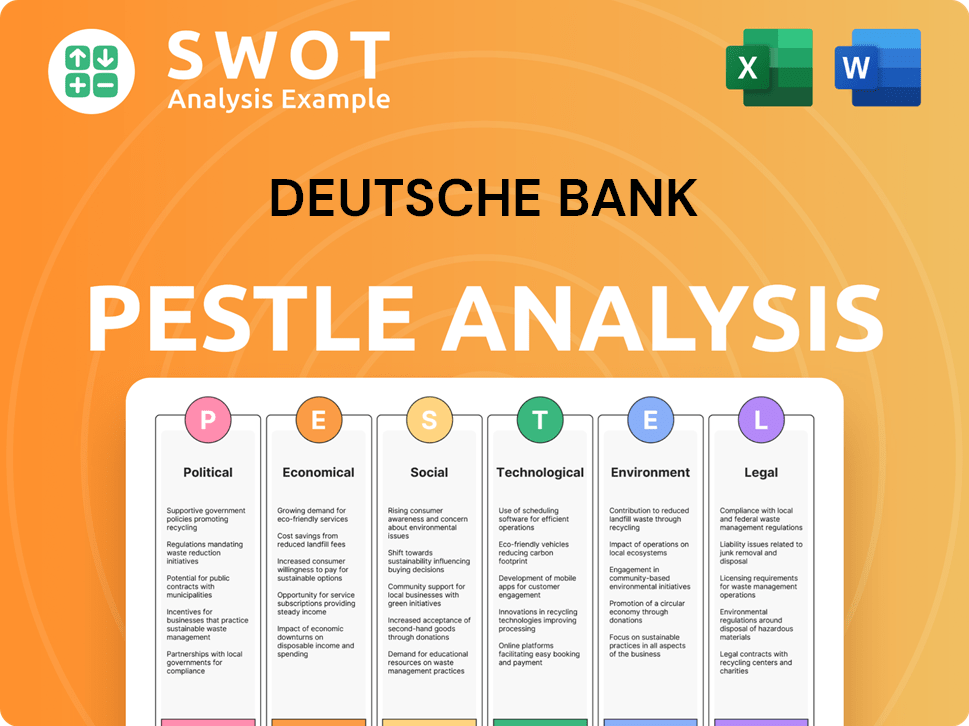
What Is Deutsche Bank’s Growth Forecast?
Deutsche Bank's financial outlook is centered on achieving sustainable profitability and maintaining a strong capital position. The bank has set ambitious financial targets for the coming years, aiming for a post-tax Return on Tangible Equity (ROTE) exceeding 10% by 2025. This goal is supported by anticipated revenue growth across its core business segments.
The Corporate Bank is expected to continue its growth trajectory, fueled by increased client activity and the expansion of digital offerings. The Private Bank is also poised to contribute significantly, with a focus on expanding its wealth management services. These strategic initiatives are designed to enhance Deutsche Bank's competitive position within the financial services industry.
In the first quarter of 2024, Deutsche Bank reported a profit before tax of EUR 1.5 billion, reflecting a 10% year-on-year increase. Net revenues for the quarter reached EUR 7.8 billion, a 1% increase compared to the previous year. The bank's Common Equity Tier 1 (CET1) capital ratio stood at a robust 13.4% at the end of Q1 2024, demonstrating strong capital reserves.
Deutsche Bank aims for a post-tax Return on Tangible Equity (ROTE) of greater than 10% by 2025. This target reflects the bank's strategic focus on improving profitability and efficiency across its various business segments.
The bank plans to return EUR 8 billion of capital to shareholders by 2025. This commitment underscores Deutsche Bank's confidence in its future financial performance and its ability to generate strong returns.
Deutsche Bank reported a profit before tax of EUR 1.5 billion in Q1 2024, a 10% increase year-on-year. Net revenues for the quarter were EUR 7.8 billion, reflecting a 1% increase compared to the previous year.
The bank's Common Equity Tier 1 (CET1) capital ratio was a robust 13.4% at the end of Q1 2024. This strong capital position supports Deutsche Bank's ability to withstand economic challenges and invest in future growth.
Analyst forecasts generally align with the bank's positive outlook, acknowledging the progress made in its strategic transformation. This strong financial narrative underpins Deutsche Bank's ability to fund its expansion initiatives and technology investments, positioning it for continued growth. The bank's focus on digital transformation and sustainable finance further supports its long-term Deutsche Bank growth strategy.
The Corporate Bank and Private Bank are key drivers of revenue growth. Increased client activity and the expansion of wealth management services are expected to fuel this growth. Investment banking trends and the global economic outlook also play a significant role.
Deutsche Bank is focused on strategic initiatives, including digital transformation and sustainable finance. These initiatives are designed to enhance efficiency, improve client services, and contribute to long-term value creation. The bank's expansion plans in Europe are also a key focus.
Deutsche Bank prioritizes robust risk management and regulatory compliance. The bank's strategies include proactive measures to mitigate risks and ensure adherence to global regulations. This approach is crucial for long-term sustainability.
The impact of interest rates is a key factor influencing Deutsche Bank's financial performance. The bank actively manages its interest rate exposure to optimize profitability. Changes in interest rates affect both revenue and cost structures.
Deutsche Bank's long-term investment strategy focuses on sustainable growth and shareholder value. This strategy includes investments in technology, talent, and strategic partnerships. The goal is to build a resilient and competitive financial institution.
Deutsche Bank's market share analysis provides insights into its competitive position. The bank continuously monitors its market share across various business segments. This helps in identifying opportunities for growth and improvement.
Deutsche Bank Business Model Canvas
- Complete 9-Block Business Model Canvas
- Effortlessly Communicate Your Business Strategy
- Investor-Ready BMC Format
- 100% Editable and Customizable
- Clear and Structured Layout
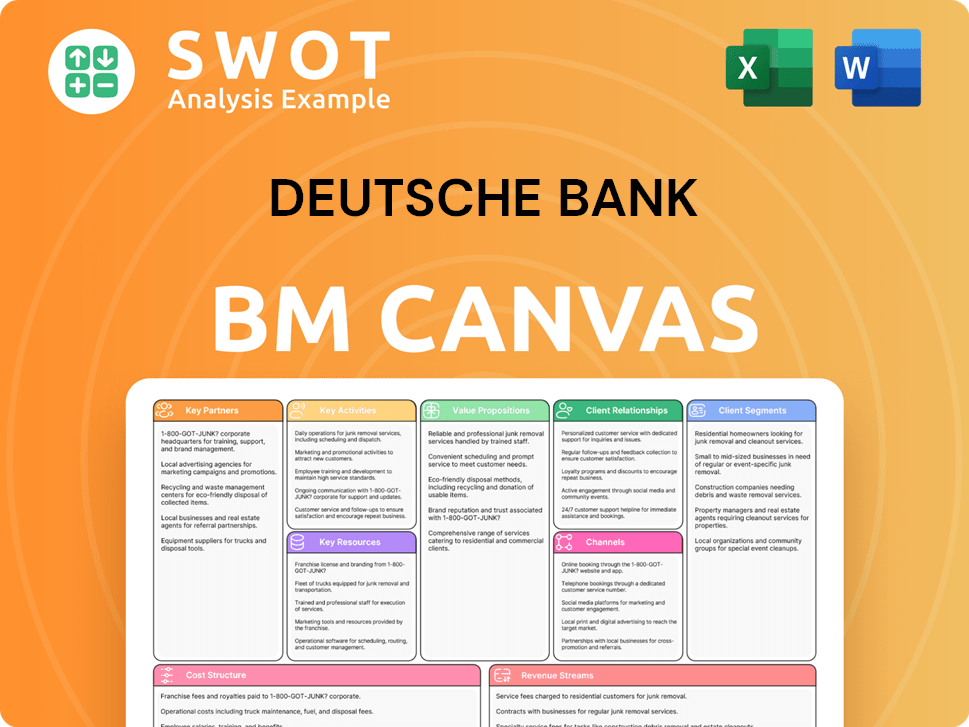
What Risks Could Slow Deutsche Bank’s Growth?
The growth strategy of Deutsche Bank faces several potential risks and obstacles. These challenges span market competition, regulatory changes, and macroeconomic factors. Understanding these risks is crucial for assessing the bank's future prospects and overall company analysis.
Market competition from FinTechs and established financial institutions poses a significant threat. Regulatory changes, such as those concerning data privacy, can increase operational costs. Furthermore, geopolitical instability and economic downturns could impact client activity, affecting revenue generation.
Internal challenges, including attracting and retaining top talent in specialized areas like cybersecurity, also present risks. The bank's ability to manage these risks through effective strategies will be critical for its long-term success. For a deeper dive into the financial aspects, consider exploring the Revenue Streams & Business Model of Deutsche Bank.
The financial services industry is highly competitive, with FinTechs and other global financial institutions vying for market share. This competition can put pressure on margins and require continuous innovation to maintain a competitive edge. The competitive landscape includes both traditional banks and new digital players challenging Deutsche Bank's market share.
Deutsche Bank must navigate evolving regulatory requirements globally, impacting its operational costs and business models. Compliance with regulations related to data privacy, capital adequacy, and anti-money laundering (AML) requires significant resources and adjustments. Regulatory challenges are a constant factor in the financial services sector.
Geopolitical instability and macroeconomic factors, such as inflation or recessionary pressures, can significantly impact client activity and asset valuations. These conditions can lead to decreased trading volumes, reduced investment banking activity, and increased credit risk. The global economic outlook directly affects Deutsche Bank's financial performance.
Technological advancements, including blockchain and AI, can disrupt traditional banking models. Deutsche Bank must invest in digital transformation to remain competitive and meet evolving customer expectations. The bank's digital transformation strategy is key to navigating this disruption.
Attracting and retaining top talent, especially in specialized areas like cybersecurity and data science, is crucial for innovation and growth. Competition for skilled professionals can be intense, potentially hindering Deutsche Bank's ability to execute its strategic initiatives. Resource constraints can impact the bank's ability to adapt.
Increasing cyber threats and the growing complexity of managing vast amounts of data securely and compliantly pose significant risks. The financial sector continues to face sophisticated cyberattacks, necessitating continuous investment in cybersecurity measures. In 2024, the financial sector saw a 38% increase in cyberattacks compared to the previous year, according to industry reports.
Deutsche Bank employs a comprehensive risk management framework that includes diversification of business lines, robust stress testing, and scenario planning. This framework aims to identify and mitigate potential risks proactively. The bank's strategic plan emphasizes resilience and adaptability as key components of its future trajectory.
The bank's financial performance is subject to fluctuations based on market conditions and strategic initiatives. In 2024, interest rate changes and geopolitical events have influenced the financial sector's profitability. Deutsche Bank's financial performance review shows its ability to navigate these challenges.
Deutsche Bank Porter's Five Forces Analysis
- Covers All 5 Competitive Forces in Detail
- Structured for Consultants, Students, and Founders
- 100% Editable in Microsoft Word & Excel
- Instant Digital Download – Use Immediately
- Compatible with Mac & PC – Fully Unlocked
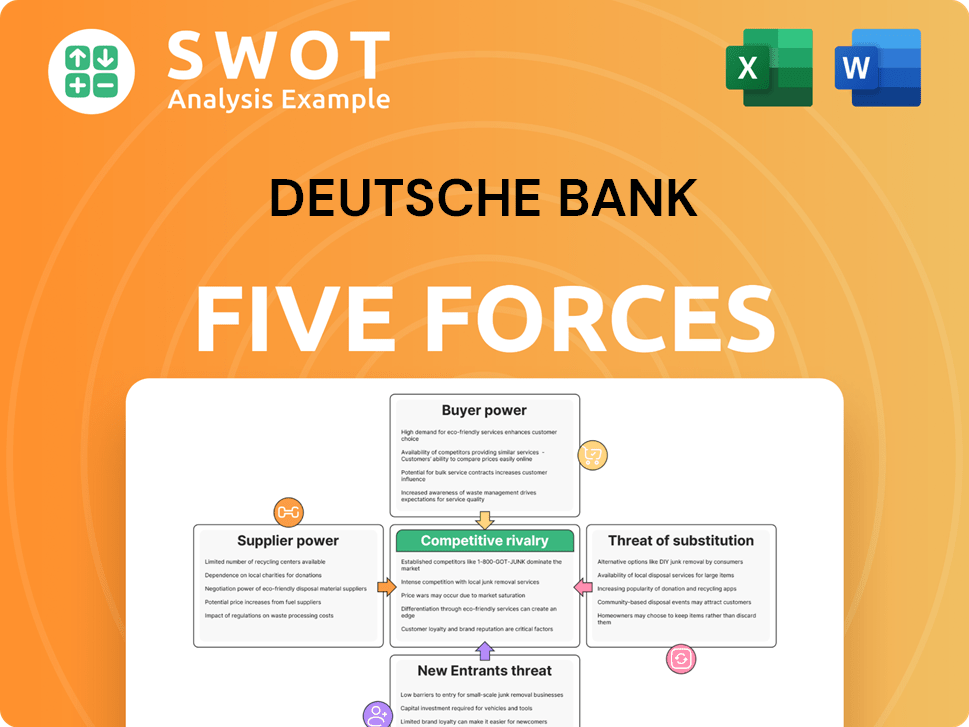
Related Blogs
- What are Mission Vision & Core Values of Deutsche Bank Company?
- What is Competitive Landscape of Deutsche Bank Company?
- How Does Deutsche Bank Company Work?
- What is Sales and Marketing Strategy of Deutsche Bank Company?
- What is Brief History of Deutsche Bank Company?
- Who Owns Deutsche Bank Company?
- What is Customer Demographics and Target Market of Deutsche Bank Company?
Disclaimer
All information, articles, and product details provided on this website are for general informational and educational purposes only. We do not claim any ownership over, nor do we intend to infringe upon, any trademarks, copyrights, logos, brand names, or other intellectual property mentioned or depicted on this site. Such intellectual property remains the property of its respective owners, and any references here are made solely for identification or informational purposes, without implying any affiliation, endorsement, or partnership.
We make no representations or warranties, express or implied, regarding the accuracy, completeness, or suitability of any content or products presented. Nothing on this website should be construed as legal, tax, investment, financial, medical, or other professional advice. In addition, no part of this site—including articles or product references—constitutes a solicitation, recommendation, endorsement, advertisement, or offer to buy or sell any securities, franchises, or other financial instruments, particularly in jurisdictions where such activity would be unlawful.
All content is of a general nature and may not address the specific circumstances of any individual or entity. It is not a substitute for professional advice or services. Any actions you take based on the information provided here are strictly at your own risk. You accept full responsibility for any decisions or outcomes arising from your use of this website and agree to release us from any liability in connection with your use of, or reliance upon, the content or products found herein.